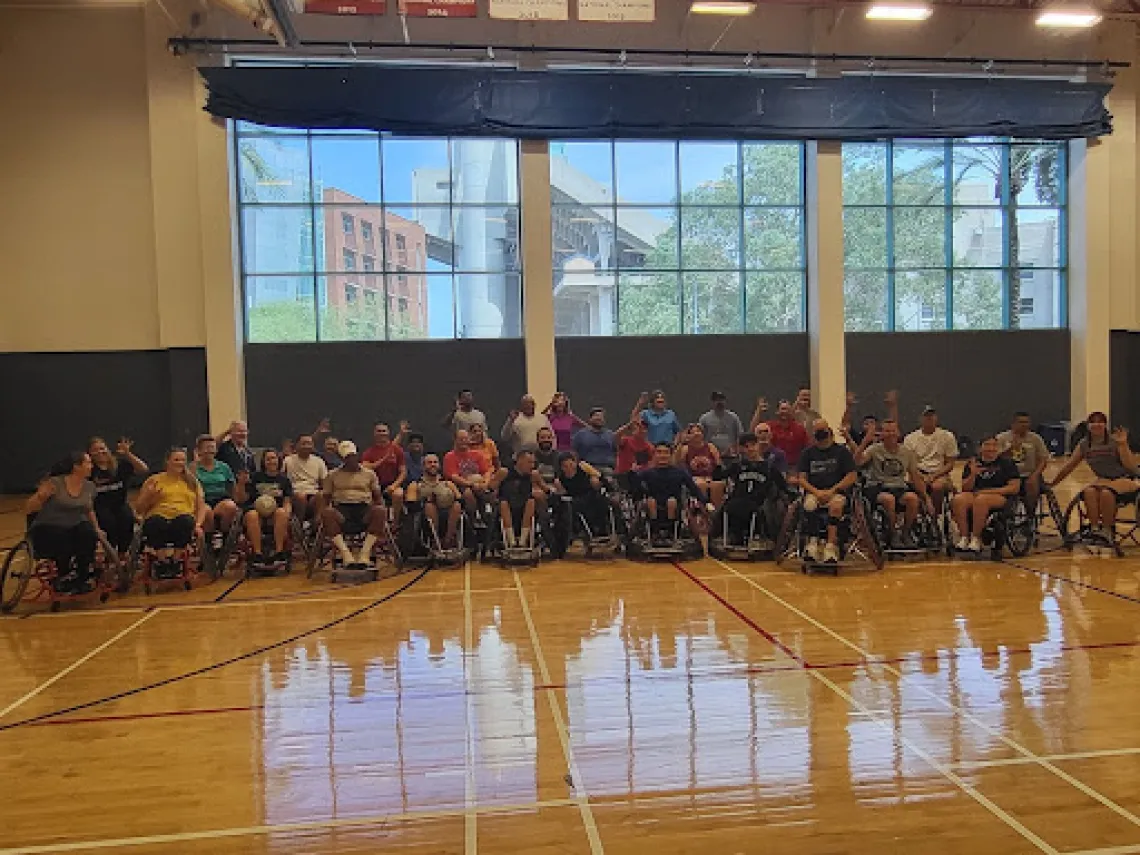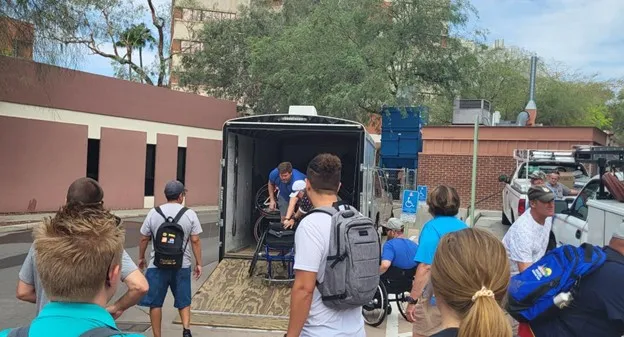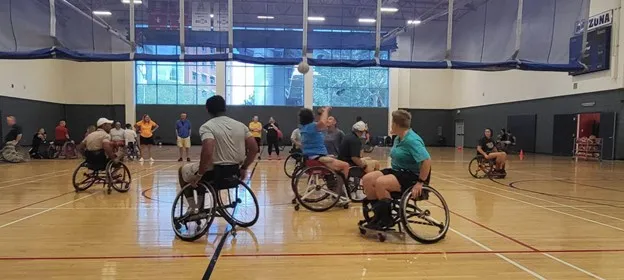Teamwork Making Dreams Work: UArizona Adaptive Athletics Program Helps Kids with Disabilities Get Active

The benefits of team sports on adolescent education are well-documented: in addition to the physical benefits of regular exercise, students can learn teamwork and problem-solving skills, boost their self-esteem, and have a place to relieve stress. However, students with disabilities may sometimes be excluded from these benefits. It is important for schools to adopt Adaptive Athletics programs—a broad term for athletics programs that make accommodations to be inclusive of those with disabilities and have faculty knowledgeable about coaching those students. Adaptive Athletics allows people with disabilities the opportunity to enjoy the benefits of exercise and team sports on their own terms.
To help schools in Tucson incorporate Adaptive Athletics programs in their curriculum, the Adaptive Athletics department at the University of Arizona invited middle school Physical Education faculty from Tucson to a demonstration of the University’s program. On August 23, physical education faculty experienced what an athlete with a disability experiences as a member of the UArizona Wheelchair Rugby Team and Wheelchair Basketball Team.
The day was meant to not only spread awareness of Adaptive Athletics, but to introduce Physical Education faculty to a UArizona program to introduce adaptive athletics to middle school students across Tucson. The program delivers 25-30 sport wheelchairs to a receptive school. Then Coach Pete Huges, Director of the UArizona Adaptive Athletic Program with Mia Hensen, Executive Director of Southern Arizona Adaptive Sports conduct sessions for students in their PE classes. They introduce the concept of adaptive sports and a couple of adaptive athletes from UArizona demonstrate the wheelchairs. Then all the students get an opportunity to try out the wheelchairs and play various wheelchair sports. While disabled students will benefit from being included in the lessons, able-bodied students will benefit from learning new sports, practicing the coordination of different muscle groups, and hopefully increasing empathy for their disabled classmates.
The idea for the program largely came from a student at the College of Public Health, Samantha Noennig. In 2022, Sam was named the University of Arizona’s Scholar Athlete. While getting her Master’s in Public Health she did an internship with Coach Pete, conducting a series of interviews with UArizona Adaptive athletes to see how the program helped them. In addition to the doors opened by athletic scholarships, she saw firsthand the boost in self-esteem, inclusion, and acceptance in these athletes.
Sam wanted to introduce Adaptive Athletics to younger students. Not only would the participating students reap the benefits of athletics, but they would be more prepared to continue athletic careers when they reach the college level. Plus, students from Tucson would be better prepared to participate in the Adaptive Athletics program at UArizona, opening more scholarship opportunities for local students.
Unfortunately, because of the lack of Adaptive Athletics programs in middle and high schools around Tucson, the majority of UArizona Adaptive Athletics athletes come from outside the Tucson area. One of the main ideas behind the wheelchair program was to give more opportunities to local athletes with disabilities. The program will work specifically with schools in the Tucson Unified School District.
Coach Peter Hughes and Samantha created the outline for the program. Funding for the program, $200,000, was generously provided by Chuck and Kerry Tyler. Of this, $100,000 went to the College of Public Health for this program, and the other half to the U of Arizona Athletics department.
Duke Duncan, MD, an affiliated faculty member of the Sonoran Center for Excellence in Disabilities, was the advisor for Sam and served as a consultant on this program. “People who were excluded now are included because they’re recognized as capable, their self-esteem goes up and scholastic scores go up,” said Dr. Duncan.
Through Dr. Duncan, the Sonoran Center is proud to support this endeavor, as it exemplifies the Center’s motto of expanding possibilities and enhancing independence.
The demonstration day on August 23 began with a presentation by Coach Pete and testimonies from UArizona athletes about their experiences. Then, the educators were given a tour of the Adaptive Athletics gym, which has exercise equipment specifically designed for use by people with disabilities.
Next, the group moved outside to where a truck containing a number of specially designed sports wheelchairs was parked. These are the wheelchairs the Physical Education faculty would use during the Adaptive Athletics exchange program. These chairs have a number of design specifications that make them suitable for athletic use: they are made of durable material, and their wheels are angled slightly outward making them easier to maneuver. They are also equipped with bars along the front and sides of the chair to absorb the impact of collisions. Finally, they are outfitted with coverings over the wheels’ spokes, preventing one’s fingers, clothes, or hair from accidentally getting caught.
The P.E. faculty were invited to use the wheelchairs to get from the parking lot to the UArizona Rec Center. Some of the educators struggled at first, but soon many were moving along Park Avenue (with some help as necessary).

Once in the Rec Center, the group moved to the gymnasium, which was reserved for the occasion. Several U of Arizona athletes and Coach Pete provided a demonstration of what practice looks like for the Wheelchair Rugby and Wheelchair Basketball teams.
First, the athletes began by playing a few warm-up games, including Sharks & Minnows and Nemesis Tag. The educators trying out the wheelchairs took part in these games.

The athletes then proceeded to play a scrimmage game of Wheelchair Rugby. Here you could see the incredible athleticism of these players. Their quick turns, sharp reflexes, and sheer endurance were on full display. The Educators’ own limited experience with using these wheelchairs simply emphasized how hard these athletes work to play at the top levels.
Reception of the event among the educators was overwhelmingly positive. When asked via a show of hands, all of them indicated that they were interested in applying for the Wheelchair Adaptive Athletics program at their school. They also expressed an appreciation for the benefits of Adaptive Athletics in general.
